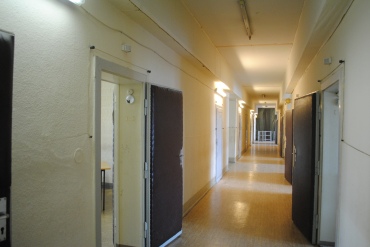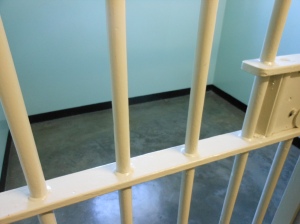Disclaimer: The name of the prison is not mentioned and the names of the inmates have been altered for privacy protection purposes.
 9 AM. Security guards line up along the corridor at a young offenders prison in the UK. They escort one inmate at a time to their respective classroom. I only carry my notepad and a pen – anything else including phones is strictly prohibited. The inmates are between 15 and 18 years old and wear grey sweatshirts and sweatpants. As they walk down the corridor they turn and shout, asking for my name – clearly not shy. The large majority of them committed thefts or robberies, but a handful are in for murder or rape. I don’t know who is in for what and some of my colleagues have chosen not to inquire. They say it changes your perception of the inmate in a negative way. Together with Maggie, an art teacher, I wait in the corridor until all inmates have entered. She unlocks the classroom door using one of the keys on her heavy keychain that she carries in a special pocket fixed around her belt. She locks the door behind us.
9 AM. Security guards line up along the corridor at a young offenders prison in the UK. They escort one inmate at a time to their respective classroom. I only carry my notepad and a pen – anything else including phones is strictly prohibited. The inmates are between 15 and 18 years old and wear grey sweatshirts and sweatpants. As they walk down the corridor they turn and shout, asking for my name – clearly not shy. The large majority of them committed thefts or robberies, but a handful are in for murder or rape. I don’t know who is in for what and some of my colleagues have chosen not to inquire. They say it changes your perception of the inmate in a negative way. Together with Maggie, an art teacher, I wait in the corridor until all inmates have entered. She unlocks the classroom door using one of the keys on her heavy keychain that she carries in a special pocket fixed around her belt. She locks the door behind us.
 I meet Andrei, a 16 year old who moved with his family from Rumania to the UK. Andrei is a Romani (‘Gypsy’). He was caught by the police robbing a corner store and was sentenced to half a year in prison. I am told that he could hardly speak English when he arrived three months ago, but he has come a long way since then. I find him arguing with his British inmates about whether the Volga is an actual river. In March he will be deported back to Rumania, where his father as well as his girlfriend are waiting for him. He is supposed to get married and expects to have children very soon. He wants to live in Germany some day. His mom took off along with his three sisters after she found out that he had smoked weed. I can see how is cheerful character recedes as he tells me that he may never see them again. It truly pains him. He promised himself never to smoke weed again and hopes to make things right with his mom in the future. Like most of the inmates Andrei regrets what he did. When I was asked about what the inmates were like I found myself saying over and over again: “They’re just kids who did something stupid.”
I meet Andrei, a 16 year old who moved with his family from Rumania to the UK. Andrei is a Romani (‘Gypsy’). He was caught by the police robbing a corner store and was sentenced to half a year in prison. I am told that he could hardly speak English when he arrived three months ago, but he has come a long way since then. I find him arguing with his British inmates about whether the Volga is an actual river. In March he will be deported back to Rumania, where his father as well as his girlfriend are waiting for him. He is supposed to get married and expects to have children very soon. He wants to live in Germany some day. His mom took off along with his three sisters after she found out that he had smoked weed. I can see how is cheerful character recedes as he tells me that he may never see them again. It truly pains him. He promised himself never to smoke weed again and hopes to make things right with his mom in the future. Like most of the inmates Andrei regrets what he did. When I was asked about what the inmates were like I found myself saying over and over again: “They’re just kids who did something stupid.”
On a Friday we admitted a 16 year old boy named Mark who had robbed a woman with two of his buddies on the street. Mark was clearly frightened as he was only incarcerated yesterday. He seemed quite shaken, but accepting of his new reality. I can only imagine how tough it must be for a 16 year old to lie in his bed at night, inside a locked room, listening to the other inmates shouting through the walls, trying to have a conversation. No soothing words of your parents across the phone line, no internet to distract your mind. The full realisation of your situation sinks in.
Mark tried to commit suicide over the weekend. He is now being monitored very closely.
 The plexiglas windows have steel bar reinforcements and the doors are locked by the teacher from the inside. In case of an emergency, the teacher can press a green button on the wall, which will summon security guards within 10-20 seconds. A lot can happen in 20 seconds, given you reach the green button. There have been cases of violence against teachers – it’s a very real job hazard. However, most of the violence occurs between the inmates. I saw security guards rushing past my classroom because a boy had thrown chairs at another boy. He had to get stitches. In one of my classes, one of my boys threw another over the table – supposedly play fighting. It’s understandable why teachers refrain from pushing the kids too much.
The plexiglas windows have steel bar reinforcements and the doors are locked by the teacher from the inside. In case of an emergency, the teacher can press a green button on the wall, which will summon security guards within 10-20 seconds. A lot can happen in 20 seconds, given you reach the green button. There have been cases of violence against teachers – it’s a very real job hazard. However, most of the violence occurs between the inmates. I saw security guards rushing past my classroom because a boy had thrown chairs at another boy. He had to get stitches. In one of my classes, one of my boys threw another over the table – supposedly play fighting. It’s understandable why teachers refrain from pushing the kids too much.
 In theory, the boys have excellent conditions to pursue their school work. They get 30 hours of education per week, classes have no more than 2-7 students and teachers can often times tutor them on a one-on-one basis. The lessons can be tailored to individual goals and needs. Every inmate gets a cell with a desk and a chair to work in peace. The classrooms are just 3 minutes away by foot. Ideal conditions – in theory.
In theory, the boys have excellent conditions to pursue their school work. They get 30 hours of education per week, classes have no more than 2-7 students and teachers can often times tutor them on a one-on-one basis. The lessons can be tailored to individual goals and needs. Every inmate gets a cell with a desk and a chair to work in peace. The classrooms are just 3 minutes away by foot. Ideal conditions – in theory.
In practice, most of the kids hardly make any progress. Most of them were never good at school and never learned how to work with discipline and persistence. Most of them don’t have academic goals such as passing their GCSE or A-Levels. An achievement mindset has to be taught – primarily by the parents who set an example. Many of the inmates have poor socio-economic backgrounds, nobody to push them forward and no emphasis on education. The teachers they meet in prison are in many cases the only person in a long time who tries to push them forward academically.
It pains me to see that many teachers actually don’t push the inmates very much. The drive and the sense of accountability that I felt in the presence of other teachers at an outstanding school in central London was missing inside the prison. Teachers don’t stick around long enough to build deep enough relationships. Maybe, teachers have little hope in truly having an impact on the lives of these children. Many of them only stay for 100 days or half a year and then return to the very environment in which they derailed in the first place. It is difficult – if not impossible – to achieve true and lasting changes in a young person’s life within such a short amount of time. Education is all about patience. A the delicate offshoot needs to grow in a protected space until strong enough to stand by itself. Teachers cannot be expected to solve such deep running problems within 100 days. Maybe they don’t push the inmates because they have no hope for them.
Connor was by far the brightest student I met during my stay. He was 17 years old and hasn’t gone to school for three years. He wanted to know what the Large Hadron Collider does and whether cancer will soon be curable in all cases I explained to him how mutations lead to cancer, why they are detrimental for the body, how chemotherapy works and why a bone-marrow transplant is such an ingenious therapy for Leukemia patients. His thirst for knowledge was incredible and much more than that of any student I have ever met in school. He told he he wants to do his GCSE and A-Levels, but thinks these degrees are unattainable for him. He lacks a lot of self-confidence.
Even if Connor pushes himself over the remaining half year in prison he will probably not continue on a success trajectory. Many return to prison because they derail in their home environments – just like they did in the first place. There are exceptions to the rule and I hope that Connor can pull through, but the odds are stacked against him. Conner does have more of a shot than the others and it is for inmates like him that teachers have to continue pushing.
Yes, Andrei, Mark and Conner have the odds stacked against them. Teachers can only influence them for a short period of time, they’ll return to the same environment that got them into prison and will likely be back in a few months. Education will only be stressed inside prison. But maybe, if teachers push the inmates enough, they can foster enough self-confidence and communicate the importance of education so that the boys can continue on that trajectory without external help. In an ideal world, the prison would offer an intervention plan that stretches beyond their prison stay. They would get the needed support until they can support themselves. In the end they are just kids who did something stupid and don’t have the support they need. They are lost and need guidance from adults who care about them and their academic achievements. 30 hours of school per week is a good start, but hardly enough for the most needy kids out societies. May these kids beat the odds. I wish them all the best.

Wow. That is a tough mountain to climb. May they be infused with strength!
LikeLiked by 1 person